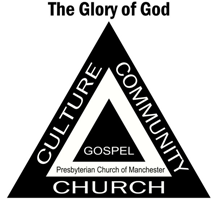Presbyterian Church of Manchester
 Elder Mancini
Elder Mancini
Welcome to the Presbyterian Church of Manchester (or PCM as we affectionately call ourselves)! We are a gospel-centered church where everything is directed towards the glory of God. We long to see the gospel transform our church and other churches, our local communities, and our culture.
If you are curious to get to know us even better, you've come to the right place. Below, you'll find our doctrinal statements, a listing of our officers and staff, as well as our positions on various hot button subjects. But, of course, there's no better way to get to know us, than to join us Sunday morning for worship! We'd be glad to have you with us.
We are Evangelical, Reformed, and Presbyterian.
By Evangelical we mean that we emphasize the gospel (good news of salvation) through faith in Jesus Christ, as well as affirming other orthodox Christian doctrines and holding to the inerrancy of Scripture.
By Reformed we mean that we are connected to the teachings of the historic church and the doctrinal beliefs recovered by the Reformation. These doctrinal beliefs are expressed in the Westminster Confession of Faith with the Larger and Shorter Catechisms. All pastors, elders and deacons of the Presbyterian Church in America must personally subscribe to and uphold the teachings of the Westminster Confession of Faith.
By Presbyterian we describe our representative form of church government. Local churches are governed by a “Session” of “presbyters” (elders), elected by the members of the congregation. Representatives of local churches within a geographical area compose a “presbytery.” Representatives of presbyteries meet annually at “General Assembly.” Thus, through the combined efforts and resources of all of the churches, we are enabled to advance God’s Kingdom much more effectively.
We believe the Bible is the written word of God, inspired by the Holy Spirit and without error in the original manuscripts. The Bible is infallible and authoritative in all matters of faith and practice.
We believe in the Holy Trinity. There is one God, who exists eternally in three persons: the Father, the Son and the Holy Spirit.
We believe that all are sinners and totally unable to save themselves from God’s displeasure, except by His Mercy.
We believe that salvation is by God alone, as He sovereignly chooses those He will save. We believe His choice is based on His grace, not on any human individual merit, or foreseen faith.
We believe that Jesus Christ is the eternal Son of God, who through His perfect life and sacrificial death atoned for the sins of all who trust in Him alone, for salvation.
We believe that God is gracious and faithful to His people not simply as individuals but as families in successive generations according to His Covenant promises.
We believe that the Holy Spirit indwells God’s people and gives them the strength and wisdom to trust Christ and follow Him.
We believe that Jesus will return, bodily and visibly, to judge all mankind and to receive His people unto Himself.
We believe that all aspects of our lives are to be lived to the glory of God under the Lordship of Jesus Christ.
Every orthodox Christian church believes in the core doctrines historically embodied in the Apostle’s and Nicene Creeds. Traditional Presbyterian churches like ours also subscribe to the Westminster Confession of Faith. But more can be said about any particular Presbyterian Church. This list of values is an attempt to further describe the Presbyterian Church of Manchester.
We Value the GospelThe Gospel is the good news of Jesus Christ. We believe the Protestant Reformation recovered a precious insight into the heart of the Gospel. That insight has been summarized in what has been called “The Five Solas”. Salvation is by grace alone, through faith alone, in Christ alone, as taught in the scriptures alone, for God’s glory alone. At PCM that message is at the heart of all the preaching and teaching.
We Value a Reasoned FaithThere has been a great deal of debate over the relationship between faith and reason over the last 2,000 years. At PCM it is assumed that believing in God is a perfectly reasonable thing to do. Indeed, we think God gave us our minds and he wants us to use them when we think about him.
Reason helps Christians understand their faith; it also helps unbelievers believe the faith. Those are two of the reasons we value a reasoned faith at PCM.
We Value PrayerBecause God is sovereign he is the first one we should turn to when in need. Furthermore, the most important things that need changing in the world we can’t change. At the top of that list is the human heart.
That is why we pray. At PCM we stress prayer in worship, in our ministries, and in our homes. We strive to pray at all times. And to reinforce the practice of prayer we set aside time for prayer meetings.
We Value the Fellowship of the Local ChurchFocusing on God and using your mind for his glory should not make you cold and indifferent to people. It should produce just the opposite effect. At PCM we believe understanding God’s grace will make us so grateful our hearts will be enlarged and made more loving. We strive to express that love in our fellowship.
We Value WorshipIn an entertainment crazy culture it is easy to think that the church is just one more place to be entertained. But the reverse is true. We are not the audience; it is more accurate to say we are the performers. But even that is not entirely right. We don’t try to entertain God when we worship him – we worship him to glorify him.
The very name “worship service” should provide a clue that everything done in worship is done for the service of God. The delightful surprise is that when we truly worship him we get something better than entertainment – we get joy.
We Value Spiritual FormationWhen God saves his people he does all the work. But when he saves them he also begins a good work in them. God uses Bible reading and prayer, Sabbath worship and the sacraments, among other things, to perform that good work. He uses these things to form us and make us more like our Lord and Savior, Jesus Christ.
We Value our GiftsThe Reformation helped to recover the Biblical doctrine of “the priesthood of all believers.” That doctrine teaches that God has tasks for all his children to perform.
Since those tasks are varied, God gives a variety of gifts to his children to perform those tasks. Because God wants his children to work together, he never gives any child everything needed for the job. At PCM those are reasons why we value our gifts and we value each other.
We Value Redemptive OutreachScripture teaches that the world was sold to sin but God has bought it back in Christ.
Redemptive outreach happens when Christians evangelize those living under the slavery of sin; it also happens when they perform works of mercy to those suffering the pain of sin’s rule; and finally, it happens when Christians perform every deed in every sphere of life with the purpose of bringing that sphere under the life-giving rule of the Redeemer King – the Lord Jesus Christ.
We Value AdventureWhen the Lord Jesus calls people to follow him he is calling them to join an adventure.
Good stories have happy endings. But to enjoy the story one must pass through all the twists and turns of the plot. A good author doesn’t tell a reader how everything will work out – the reader has to trust the author and wait to find out how things will end.
The same is true of the Gospel. Since God’s people are still living through a story God is telling, they have to trust the Author and walk by faith and not by sight. Along the way there will be victories followed by set-backs and seemingly hopeless dilemmas followed by last-minute rescues. Sadly some of the best characters will die before the end. But God gives faith and courage to follow Christ all the way to the last chapter. The way God does this is by giving a glimpse of the happy ending. That glimpse comes by the proclamation of the Gospel – the good news that Jesus Christ has risen from the dead.

PCM is a gospel-centered church where everything is directed toward the glory of God. We long to see the gospel transform our church and other churches, our local communities, and our culture.
At PCM, we pray for and look for the works of the Gospel. Those works are seen in Acts 2:42-47.
Teaching Elder

Ruling Elders








Many of our members are involved in leading ministries within our Church. We have pictured here just those whom we think you would like to know in advance to visiting our congregation.

Sunday mornings normally begin with prayer for the lost at 8:30 am, followed by Sunday School at 8:45 am, with Worship at 10:00 am. Our services generally last between an hour and an hour and fifteen minutes. We celebrate the Lord's Supper during worship on the first Sunday of each month. Visitors are welcome to join us for lunch, as a different Shepherding Group meets every Sunday of the month (with the fifth Sunday of the month being a full congregational fellowship meal).
During the Summer months, we follow a modified Schedule, giving our Sunday School teachers time off. Then, Sunday mornings begin with prayer for the lost at 9:00 am, followed by Worship at 10:00 am.
At PCM we believe everything we do should begin and end with the glory of God. That means more than simply including God in our thinking; it means trying to understand how we fit into God’s thinking.
This includes the music we use in worship. A philosophy of art is known as an aesthetic. In this case the aesthetic is musical. What is the reasoning behind our choices of musical content and expression at PCM?
Our musical aesthetic is informed by three theological truths.
Christian worship is a response to God’s grace in Christ
Grace is what makes Christian worship possible. Since human beings are born slaves to sin, without the liberating grace of God we cannot serve God with our hearts. Instead we worship idols of our own making.
But God has spoken to us graciously in Christ. Because we are completely powerless to save ourselves, Christ saved his people. That’s why Christian worship always begins with God’s Word to us in Christ.
There is a second part to Christian worship though. There is a time for us to speak. We respond to God’s grace in Christ with thanksgiving and praise; and also with confession and repentance.
Those are the two parts to Christian worship: God speaking to us and us speaking to God.
Christian worship uses the good gifts of creation
When God placed Adam and Eve in the Garden of Eden he told them to cultivate it. They were to work as God’s regents, made in his image, to work with the good things they’d been given and employ them in novel ways to the glory of God and their own enjoyment.
One rule governed their time in the garden. They were commanded not to eat of the Tree of the Knowledge of Good and Evil. As we know they ate what they were told not to eat. So instead of abstaining to the glory of God, they ate to their own glory and died.
From Adam we have inherited a propensity to use the creation sinfully – with an eye to our own glory rather than the glory of God. And in so doing our works become a source of misery to us rather than joy.
But the creation is still good, even though we are prone to use it sinfully. So we should use the good gifts of creation boldly in the worship of God, but with this caveat – the commands of the Lord must be obeyed. What is clearly directed in the scriptures must be followed. God places limits on our creativity. Worship is not a “do as you please” proposition.
Well-crafted worship orders all the music used in worship to the glory of God
God made all things and declared them good. That includes every sound and rhythm. There is not a sound of any kind that can be declared evil – just as there is no color or smell or taste which can be declared evil.
To say that all sound is good doesn’t mean that any sound is good for anything you want to use it for. Placement and use need to be considered.
Because the world is good, it is rational and we can understand it. Even when discernment is difficult, some measure of understanding is possible. When it comes to the sounds of music those sounds can be judged by simply asking the question, “What are those sounds good for?”
Some people think that any sound can mean anything you want it to mean. In other words, sounds find their meaning relative to the uses they are put to. Oddly, this version of relativism has become a popular justification for an indiscriminant approach to music in worship.
But musical forms are not neutral. They possess inherent meaning because God has made a meaningful world. Even Hollywood understands this. Film makers spend a lot of money making sure that their musical scores support their plots, characters, and settings. How would the score to, “The Sound of Music” work for “Star Wars”? Leaving film aside, imagine the reaction of the American people to the President of the United States being greeted on the tarmac in Paris by a rousing rendition of the Star Spangled Banner played by a band made up entirely of kazoos. Or what would you think of setting the text of “Amazing Grace” to the tune from Gilligan’s Island?
These examples serve a point. Forms are content. There is no such thing as a neutral form. Without considering the propriety of the forms we use we may compromise the very intent of a lyric or the purpose of a portion of a worship service. When it comes to form and content they should exist in harmony. If we don’t keep that in mind we may use music that does not fit well with the worship of God.
The Musical Aesthetic of PCM
The musical aesthetic for PCM may be described with three terms: acoustic, eclectic, and fitting.
Acoustic
It is acoustic because we prefer to keep the relationships between musicians, music, and listeners as close as possible to God’s creation and to our expression. While we use some amplification, we do not want electronic instruments to dominate and drown out the voices of those who sing. This is rooted in our conviction that Christian worship is a response to God’s grace in Christ. Electronic music has a place in our world. It can glorify God. But it adds another layer of technology between worshippers and music and for that reason we don’t use it in worship at PCM.
Eclectic
It is eclectic in two senses. First, we want to bring together the diverse gifts God has given to our church – everything from piano to guitar to flute. Another source of our eclecticism is the cultures our people come from. It is our hope that our congregation will grow even more culturally diverse. And with their cultural backgrounds will come musical legacies. As much as we can we will seek to incorporate those musical forms in our worship.
Fitting
“Fitting” refers to the ordering of musical forms to God’s glory through worship.
There are different parts to a worship service and music should “fit” with the intent of those parts. Whether we’re speaking of instrumentals or singing, the music ought to be in harmony with purpose.
Prelude and Postlude
Prelude and postlude are much more than “bumper music” – they are intended to help the worshipper transition from the concerns of life to the worship of God. In the case of the prelude the music should help the worshipper prepare for corporate worship. Consequently it is often more reflective in nature. In the case of postlude music the intension is to aid the worshipper in moving back into the routines of daily life but with a renewed resolve to do so in the service of God.
Hymns
We’re encouraged by the Apostle Paul in Colossians 3:16 to sing Psalms, hymns and spiritual songs. Hymns are sung in response to God’s Word. Consequently they are sung with God in mind, not us. Because they are sung to God they often praise the attributes, greatness, and creating and saving work of God. Because of the subject matter they are grand and majestic in their content and presentation. They are not songs about us, or about how we are feeling; they are songs about God.
Psalms and Spiritual Songs
This is music that often is about us. It is designed to either help us bring to God the content of our hearts, or it is intended to help us order our minds and hearts. It is often used prior to prayer, during the Lord’s Supper, to accompany an offering, or even following a sermon. Because of its self-referential nature it is often informal and reflective, even intimate at times. Instrumentation should fit the intent here as much as with hymns.
Because of the narcissistic character of the times we live in, it is tempting to allow this type of music to press out hymns. But it is just as tempting in churches like PCM to make the opposite error and completely remove this type of music. It has its place and it is important for helping people respond to God’s grace in Christ.
Conclusion
There is a great deal more that could be said but this is merely intended to be an introduction to why we make the musical choices we make at PCM. It is the hope of the leadership of the church that you will both understand and appreciate the reasons behind those choices. It is also our hope that you will worship with us and strive to do so, “in spirit and in truth.” John 4:24.
Modern people think of the world in the same way people tend to think of a blank sheet of paper. They feel they should be free to write whatever they please upon it. At least that’s the case when it comes to meaningful living. They believe we make our meaning through our actions and intentions.
That’s why they consider all meaning to be subjective. Certainly that’s what the most influential artists, educators, and politicians in the modern world believe. And because of this, not only do they think we should not judge other people, they do not believe there is any basis for judgment. Meaning only exists in the eye of the beholder. You know how it goes, you have your truth and I have mine.
Perhaps this is most clearly seen in modern attitudes towards sex and marriage. These are what we make them. There is no right or wrong—we just want what we want and that’s the end of it.
But this is wrong because it leaves out a very important piece of information. The world has a Creator. Reason makes that sufficiently clear and scripture fills in the rest. And in something of a surprise—even for many Christians—the scriptures reveal that the identity of the creator is Christ himself.
The problem with many modern Christians is that they are more modern than they are Christian. They are just as likely to believe the world is a blank page as their unbelieving neighbors. This means they can be just as guilty of thinking that social institutions are just arbitrary products of human will. But if the world has a creator, even our social institutions should in some sense reflect the purposes of that creator. That doesn’t mean they will always reflect those purposes as well as they should—it just means we have a basis for determining whether they do or not. This brings us back to marriage and Christ’s purposes for it.
Marriage plays a significant role in Christ’s purposes for both this world and the world to come. Let’s start at the beginning. According to Genesis 2 the human world began with one man. Soon he is given a woman and the two of them are told to become “one flesh”. This is a clear reference to a conjugal union. Those people who would like to interpret this in some other way are playing tricks with words. It is not a reference to a spiritual union, or some sort of emotional bond. And by means of this union a man and a woman may become one flesh in a fuller way. Each makes a contribution of flesh at a microscopic level. If the man and woman are blessed, these two portions of flesh become the flesh of a child.
The purpose of Christ in all of this is explained in the passage—the fruitfulness of the couple will fill the earth with the image of God. The term image here was a fairly common one in the ancientnear east and it always denoted regency. When someone was an image of another, he was that person’s representative. So a child is not merely the image of his parents, he is connected to a higher source. He or she is an image of God.
This is why, among other reasons, marriage has always connoted the union of a man and a woman. While this should be enough to satisfy our curiosity, there is another reason for Christians. The conjugal union of a man and a woman not only serves Christ’s purposes in this world, it also points to the next. In Ephesians chapter 5 we are told that conjugal marriage points to something even more significant than we can now fully appreciate. We are told it mysteriously adumbrates the union of Christ and his body, the church. It is because Christ is the head of his body, like a husband is the head of a wife, that we can be confident that Christ’s resurrection will bring about the resurrection of believers. And because Christ is now in glory, we can be sure that believers will also be glorified. Conjugal marriage is more than a metaphor in the way we normally think of metaphors. It is a reflection of an eternal reality, something above and beyond any program of cultural change.
This means that Christianity cannot be whole without conjugal marriage. It also means that people who attempt to equate so-called “same-sex marriage” with conjugal marriage are undermining the Christian faith. This is why our church rejects so-called “same-sex marriage” without qualification. Any compromise in this regard is a betrayal of Christ himself.
What does this mean for congregational life at the Presbyterian Church of Manchester? It means the leadership will not solemnize, honor, or in any way recognize the vows of same-sex couples, even when those vows were solemnized by a civil or ecclesial authority. Like any visitor, we will endeavor to treat a person in such a relationship with kindness, but we will not recognize a “same-sex” marriage as legitimate.